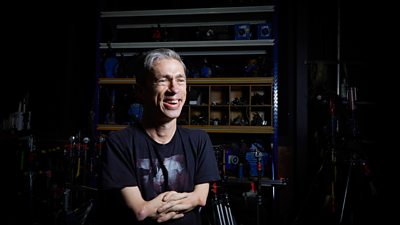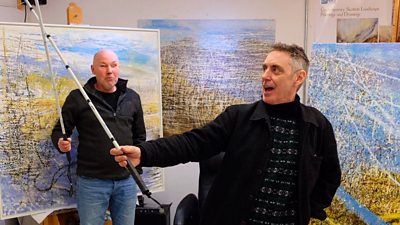Exploring Disability Through Art
This November sees the 25th anniversary of the Disability Discrimination Act, one of the greatest civil rights landmarks in our history which criminalised discrimination against disabled people in many areas of life. This moment is being marked across the ΒιΆΉΤΌΕΔ, with a special focus on the arts.

Disabled voices have been shut out of mainstream TV drama for too long and this is a chance to showcase some of the wonderful, inventive, funny, dramatic, sexy and sobering potential available.
Pictured: Mat Fraser. Image credit: ΒιΆΉΤΌΕΔ/Richard Ansett
ΒιΆΉΤΌΕΔ Four
Crip Tales (6 x 15’)
Disabled writer and actor Mat Fraser curates a series of ambitious and exciting monologues, all written, directed and performed by disabled people. Each 15-minute monologue will capture a pivotal moment or event that forever changes the central character, that is in some way connected to disability, and pushes the character to act for a vital change that improves their position.
Mat says: “I’m thrilled to be curating this exciting, surprising and revealing series of monologues around the disabled experience for the ΒιΆΉΤΌΕΔ. Disabled voices have been shut out of mainstream TV drama for too long and this is a chance to showcase some of the wonderful, inventive, funny, dramatic, sexy and sobering potential available.
"We called the series Crip Tales, as the word ‘Crip’ has been taken by the disabled community as a self-empowering title since the late 80’s, and these are authentic stories and tales from people who identify as Deaf and Disabled people and who are embedded in disabled community.”
The series will feature Liz Carr (Silent Witness) and Ruth Madeley (Years And Years) and award-winning writers including Jack Thorne (His Dark Materials; National Treasure), as well as emerging talent, including Genevive Barr and performance poet Jackie Hagan, making her TV acting debut.
The monologues are fiction but they will be based on factual research and lived experience and they will span the last 50 years of British History.
- Crip Tales is a ΒιΆΉΤΌΕΔ Studios Production. It was commissioned for ΒιΆΉΤΌΕΔ Arts and ΒιΆΉΤΌΕΔ Four by Lamia Dabboussy. Executive Producer is Debbie Christie.

The Disordered Eye (1 x 60’)
Disabled artist and filmmaker Richard Butchins challenges the importance of good vision in making great art.
From examining the work of Rembrandt, Cezanne, Monet and Munch, to the synesthesia of Kandinsky and some leading contemporary artists, Richard discovers surprising revelations about the effect of impaired vision on many painters of the last 150 years and beyond.
The film also reveals how new scientific methods, progressive social initiatives and groundbreaking technology are shedding light on the lives of our most treasured masters, and opening up the art world to people who would never previously have been able to access it.
Pictured above: Keith Salmon and Richard Butchins
- The Disordered Eye is a What Larks Production. It was commissioned for ΒιΆΉΤΌΕΔ Arts and ΒιΆΉΤΌΕΔ Four by Mark Bell. Executive Producer is Claire Whalley.
ΒιΆΉΤΌΕΔ Radio 4
Connections (3 x 45’)
Three monologues written by disabled writers and performed by a mainly disabled cast, about making choices in order to make connections.
During the current pandemic, we have experienced isolation in a way that many of us never normally encounter and have made tough choices. This is a regular daily occurrence for disabled people. Each monologue looks at a different example of isolation within the context of disability and explores what connection means to different people. The series is a lively sequence of dramas that offer entertainment, provoke thought and encourage optimism.
This programme was originally funded by the Audio Content Fund and broadcast on UK community radio.
- Produced by Naked Productions, with input from Graeae Theatre
The Thirteen Million Club (1 x 30’)
More than 13 million people in the UK identify as having some kind of disability. In a comedy club like no other, this stand-up showcase is a first step towards telling the human and hilarious stories that most of us have never heard. One which exists to give a voice to disabled people.
Bartholomew Abominations w/t (1 x 60’)
A sharp new version of Ben Jonson’s famous 1614 Jacobean drama Bartholomew Abominations, brought to vibrant modern life in a comic, political commentary about modern British identity. In a bold rewrite, Paul Sirett has revitalised this classic text, to make it a gripping piece about a very near now. Produced by Eloise Whitmore and co-directed by Polly Thomas and Jenny Sealey, this is the latest drama to feature Graeae Theatre – a company placing D/deaf and disabled artists centre stage – on Radio 4 following their adaptations of Little Dorrit, Three Sisters and The Midwich Cuckoos.
ΒιΆΉΤΌΕΔ Radio 3
Sunday Feature: The Silence Of My Pain (1 x 45’)
For 15 years, Radio 3 presenter and musician Hannah French has lived with constant pain in her leg, stemming from a genetic condition called Ehlers-Danlos Syndrome. It’s an ever-present feature of her life but despite talking about music on the radio, she shies away from using it to help manage the pain.
Could this all change? Art has the ability to conjure the agonies of pain, but it’s hugely subjective. Theatre Director Rachel Bagshaw leads Hannah into a world in which she’s channelled pain into a creative space, and at Goldsmiths University of London, Professor Joydeep Bhattacharya helps her to explore the medical science behind the phenomenon of Fascination - in which painful sensations might be suppressed long enough to give a performance.
The Silence Of My Pain is a chance for Radio 3 to focus on the biggest, often hidden, disability for classical musicians: pain.
Zichy, Wittenstein And Me (1 x 60’)
Nicholas McCarthy, born without his right hand, is a remarkable pianist who made history in 2012 when he graduated from the Royal College of Music, the only left-handed pianist to have done so in the history of the college.
When he dreamt, aged 14, of becoming a concert pianist, he had not thought of the obstacles and discouragement that he would face. Nicholas also had no idea at that time just how much two famous left-handed pianists - Geza Zichy and Paul Wittgenstein - would come to mean to him.
While the Hungarian composer Geza Zichy was the first one-armed pianist to make a career in the concert hall, Paul Wittgenstein became perhaps the most celebrated when Ravel composed him the Piano Concerto For The Left Hand after he was wounded in the First World War.
Nicholas McCarthy presents a programme of their music.
Afternoon Concert
The ΒιΆΉΤΌΕΔ Singers present a programme of music working alongside singers who are visually impaired and highlight the extraordinary abilities of reading braille music.
